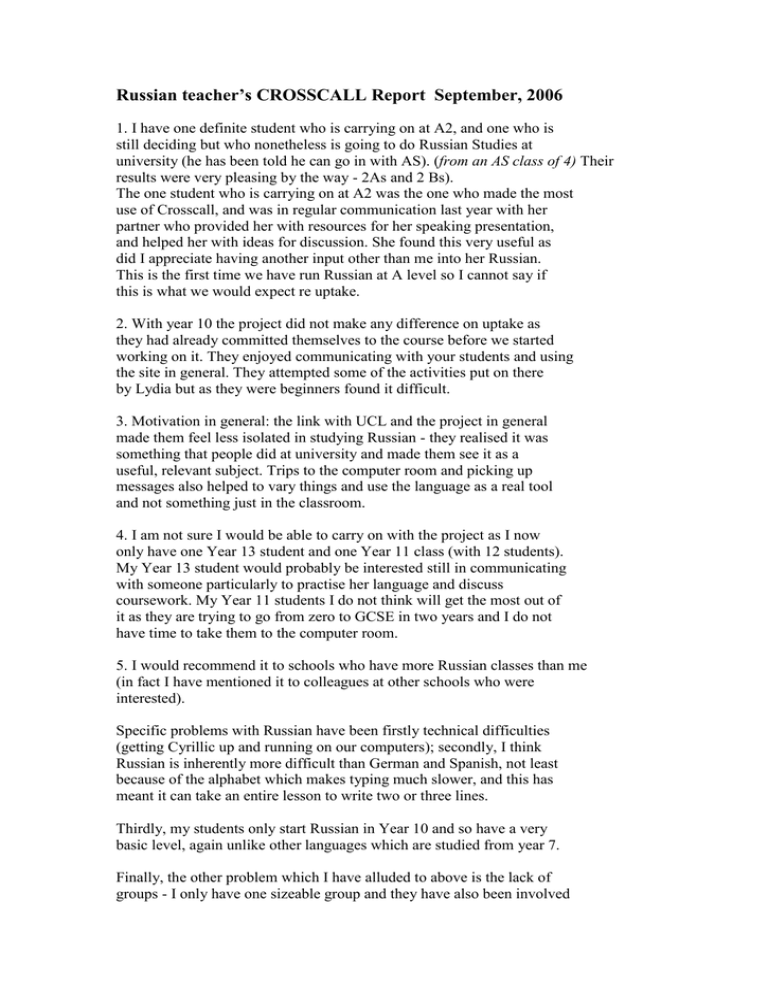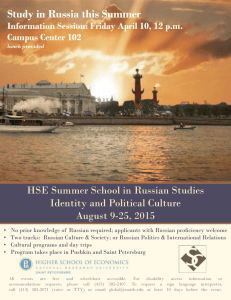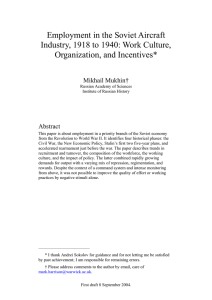Russian teacher’s CROSSCALL Report September, 2006
advertisement

Russian teacher’s CROSSCALL Report September, 2006 1. I have one definite student who is carrying on at A2, and one who is still deciding but who nonetheless is going to do Russian Studies at university (he has been told he can go in with AS). (from an AS class of 4) Their results were very pleasing by the way - 2As and 2 Bs). The one student who is carrying on at A2 was the one who made the most use of Crosscall, and was in regular communication last year with her partner who provided her with resources for her speaking presentation, and helped her with ideas for discussion. She found this very useful as did I appreciate having another input other than me into her Russian. This is the first time we have run Russian at A level so I cannot say if this is what we would expect re uptake. 2. With year 10 the project did not make any difference on uptake as they had already committed themselves to the course before we started working on it. They enjoyed communicating with your students and using the site in general. They attempted some of the activities put on there by Lydia but as they were beginners found it difficult. 3. Motivation in general: the link with UCL and the project in general made them feel less isolated in studying Russian - they realised it was something that people did at university and made them see it as a useful, relevant subject. Trips to the computer room and picking up messages also helped to vary things and use the language as a real tool and not something just in the classroom. 4. I am not sure I would be able to carry on with the project as I now only have one Year 13 student and one Year 11 class (with 12 students). My Year 13 student would probably be interested still in communicating with someone particularly to practise her language and discuss coursework. My Year 11 students I do not think will get the most out of it as they are trying to go from zero to GCSE in two years and I do not have time to take them to the computer room. 5. I would recommend it to schools who have more Russian classes than me (in fact I have mentioned it to colleagues at other schools who were interested). Specific problems with Russian have been firstly technical difficulties (getting Cyrillic up and running on our computers); secondly, I think Russian is inherently more difficult than German and Spanish, not least because of the alphabet which makes typing much slower, and this has meant it can take an entire lesson to write two or three lines. Thirdly, my students only start Russian in Year 10 and so have a very basic level, again unlike other languages which are studied from year 7. Finally, the other problem which I have alluded to above is the lack of groups - I only have one sizeable group and they have also been involved with an e-mail link with school students in Russia, as a result that I think they have felt a bit overwhelmed with things I have asked them to do. If I had more classes I could have spread this better. Overall, I think it is a very positive project and has definitely enthused at least two of my students to take Russian at university. I appreciate very much the help you and your students have given us, as well as your patience.




